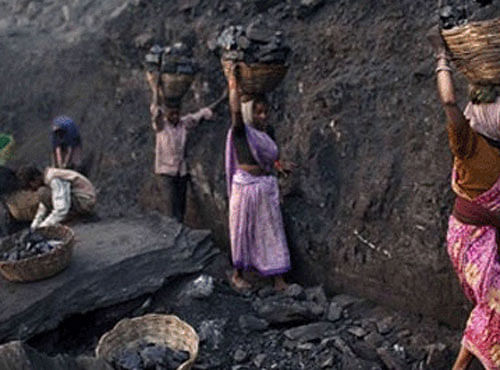
Proceeds from the ongoing coal block auctions are likely to cross Rs 2 lakh crore, surpassing CAG's estimate of Rs 1.86 lakh crore loss on account of the allocation of blocks without auction during the UPA regime.
"Likely proceeds from coal block auctions (may) cross Rs 2 lakh crore. These include e-auction proceeds, royalty proceeds and upfront payment," Coal Secretary Anil Swarup said.
"Apart from above, around Rs 97,000 crore of additional tariff benefit will accrue to the consumers of power through reverse auction of coal blocks," he added.
His remarks come at a time when the government is set to garner over Rs 11,300 crore from sale of two mines including Utkal C to Monnet Power today, the fifth day of the second tranche of auctions.
The government kitty swelled by an estimated Rs 9,537.22 crore from sale of Utkal C mine in Odisha to Monnet Power Company earlier in the day.
Bidding for Lohari block in Palamu district of Jharkhand is underway and as per present bid price of Rs 1,992 a tonne, it will cross a revenue of Rs 1,800 crore.
"Monnet Power was the highest bidder at (Rs) 770 (a tonne) for Utkal C Coal Block. Bidding still underway for Lohari. Presently at 1992," Swarup said.
The cumulative Rs 2 lakh crore revenue to the exchequer from the sale of 32 mines so far, includes over Rs 1 lakh crore from sale of 19 mines in the first tranche.
Prime Minister Narendra Modi had said earlier this month that CAG's astronomical Rs 1.86 lakh crore loss figure in coal block allocations had raised some doubts initially, but the auction of less than 10 per cent of those mines (19 mines in first tranche) alone has garnered Rs 1.10 lakh crore.
Official auditor CAG had said that the mines allocation without auction during the UPA period led to a loss of staggering Rs 1.86 lakh crore. The allotment of over 200 coal mines were later cancelled following a Supreme Court order, which led to the government announcing the ongoing auction.
Monnet Power Company bagged the Utkal C mine in Odisha today - 5th day of the second phase of coal block auctions - for an estimated Rs 9,537.22 crore.
Utkal C, meant for the power sector has an extractable reserve of 123.86 million tonnes (MT). It was previously allotted to Utkal Coal Ltd.
"Auction for Utkal C block for power sector under Talcher coalfield in Angul district of Odisha, began at 11 am with a Rs 100 a tonne bid. For Lohari, the auction began at Rs 1,690 per tonne," an official told PTI.
In the race for Utkal C were Adani Power, Adani Power Maharashtra, DB Power, Essar Power Gujarat, GMR Mining and Energy, Jindal India Thermal Power, Jindal Power, KSK Mahanadi Power Company, Lalitpur Power Generation Company, LANCO Barbandh Power, RKM Powergen, Sesa Sesa Sterlite, Sheesham Commercial and Simhapuri Energy.
For the Lohari block in Palamu district of Jharkhand, there are 7 players in the race - Araanya Mines, Easternrange Coal Mining, Rungta Mines, SKP Mining, Tata Sponge Iron, Trimula Industries and Usha Martin. It has extractable reserve of 9.04 MT and was previously allotted to Usha Martin.
In the first four days of the second tranche of auction, government has sold 12 mines mostly in eastern states to firms like Adani, Hindalco, JSW and Jindal for Rs 43,307 crore.
The blocks sold in the second tranche include Ganeshpur, Mandla South, Gare Palma Sector 1V/8, Dumri, Tara, Nerad Malegaon, Mandakini, Meral, Jitpur, Moitra, Brinda and Sasai.
There are two methods of bidding for auction of coal blocks -- forward bidding (for unregulated sectors like steel, cement and captive power) and reverse bidding (for specified end use for power generation).
In the reverse auction, the government sets a ceiling price that is representative of production cost of Coal India. The private sector companies, which are considered more efficient, are expected to bid at lower price.
For example, if the ceiling price is Rs 1,000 and the bidder bids Rs 800, then the benefit of Rs 200 is directly passed on to consumers. This would mean if the power is sold at Rs 3.50, out of which Re 1 is cost coal and the same will become 80 paise because of pass through benefit of Rs 200.
Thus, the new price of power will be Rs 3.30 a unit. In case the bids touch zero, meaning that the private producer is ready to pass on the benefit of coal extraction to power consumers, there would be a forward bidding. Under the forward bidding, the companies will be required to mention the price which they are willing to give to states.
Under the second leg of auction, the government has put 15 blocks for grab, which are under ready-for-production category.